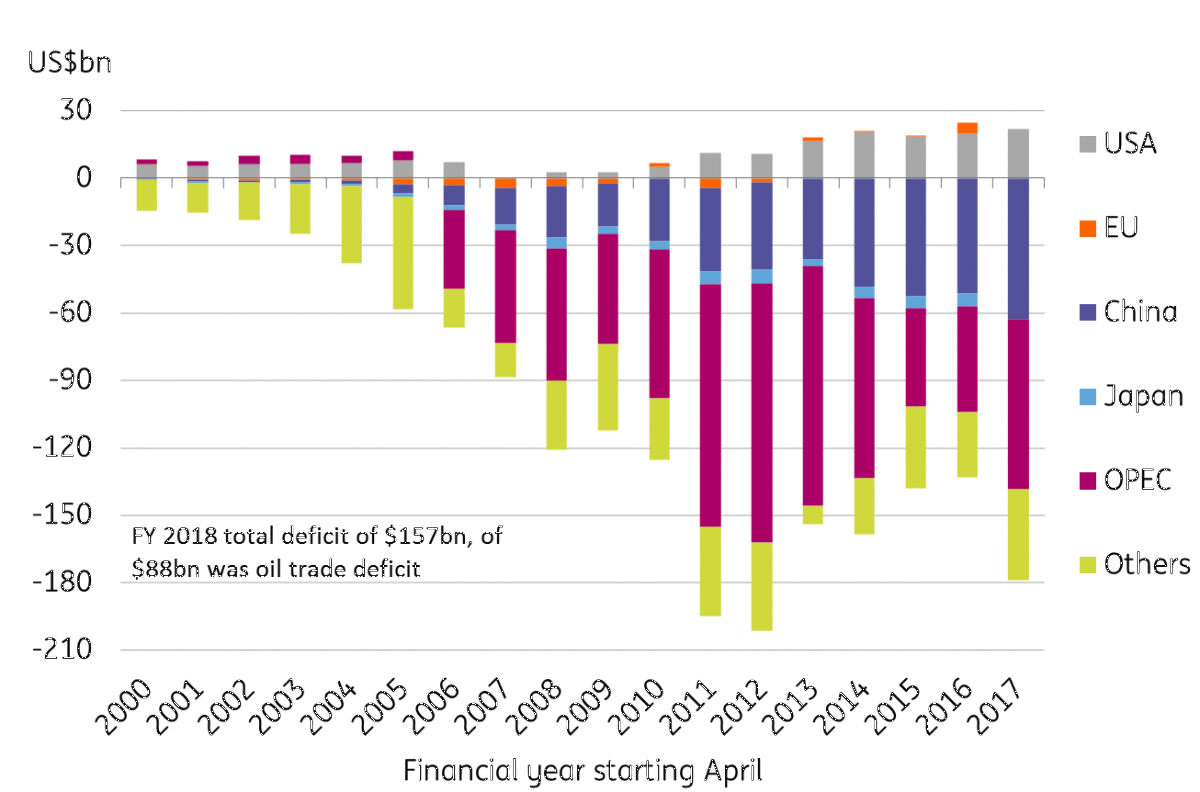India: Inflation accelerates in April
We expect a decisive shift within the central bank policy committee to tightening at the August meeting, when we forecast a 25bp policy rate hike
| 4.6% |
CPI inflation in April |
| Higher than expected | |
Rising inflation
Two measures of India’s inflation, the consumer and wholesale price indices, posted faster than expected inflation in April. The year-on-year rate of CPI inflation accelerated to 4.6% in April from 4.3% in March. The corresponding figures for WPI inflation were 3.2% and 2.5%. The consensus forecasts were 4.4% CPI inflation and 2.9% WPI inflation. Housing, healthcare and transport components were responsible for higher CPI inflation, while the WPI inflation tracked oil prices higher.
What matters more for central bank monetary policy is CPI inflation. We consider the Reserve Bank of India’s (RBI) downgrade of its inflation forecast at the bi-monthly policy meeting in early April to be premature. The RBI forecasts CPI inflation in a 4.7-5.1% range in the first half of FY2019, revised from 5.1-5.6%. Higher food, utilities and transport prices will likely push inflation above this range within the current quarter. Among other factors contributing to India’s rising inflation is the transmission of higher global oil prices. This transmission is amplified by the weakness of the currency.
As things stand, there is no near-term respite from rising inflation. We see a greater upside risk to our 4.9% full-year inflation forecast for FY2019.
| $15bn |
Consensus of trade deficit in April |
Widening external trade deficit
Trade data for April is due today and is expected to reinforce the uptrend in the trade deficit. We forecast the April deficit at $14.5bn, up from $13.7bn in the previous month. Consensus is for an even bigger deficit of $15.0bn.
Rising oil imports are pressuring the trade deficit. The total trade deficit widened to $157bn in FY2018 from $109bn the previous year. More than half of this rise was from oil. Rising global oil prices will sustain this trend in the near-term. By destination, China was the biggest source of India’s trade deficit (see figure).
Oil and China are the biggest sources of trade deficit

Policy and market implications
Elevated inflation and persistent currency weakness could nudge the RBI toward tightening. However, the consensus within the six-member policy committee is still tilted toward a policy status quo. We expect a decisive shift to tightening at the August meeting, when we forecast a 25bp policy rate hike.
But for now, the data will maintain the weakening pressure on government bonds and the Indian Rupee (INR). Recent RBI support to local bond markets is proving insufficient, while increased liquidity infusion by buying bonds is also adding to further currency weakness. We do not see an easy way out of the trap. Our year-end forecast of USD/INR at 68.30 (spot 67.5) is subject to continual upward assessment in this environment.
Download
Download article
15 May 2018
Good MornING Asia - 15 May 2018 This bundle contains {bundle_entries}{/bundle_entries} articles"THINK Outside" is a collection of specially commissioned content from third-party sources, such as economic think-tanks and academic institutions, that ING deems reliable and from non-research departments within ING. ING Bank N.V. ("ING") uses these sources to expand the range of opinions you can find on the THINK website. Some of these sources are not the property of or managed by ING, and therefore ING cannot always guarantee the correctness, completeness, actuality and quality of such sources, nor the availability at any given time of the data and information provided, and ING cannot accept any liability in this respect, insofar as this is permissible pursuant to the applicable laws and regulations.
This publication does not necessarily reflect the ING house view. This publication has been prepared solely for information purposes without regard to any particular user's investment objectives, financial situation, or means. The information in the publication is not an investment recommendation and it is not investment, legal or tax advice or an offer or solicitation to purchase or sell any financial instrument. Reasonable care has been taken to ensure that this publication is not untrue or misleading when published, but ING does not represent that it is accurate or complete. ING does not accept any liability for any direct, indirect or consequential loss arising from any use of this publication. Unless otherwise stated, any views, forecasts, or estimates are solely those of the author(s), as of the date of the publication and are subject to change without notice.
The distribution of this publication may be restricted by law or regulation in different jurisdictions and persons into whose possession this publication comes should inform themselves about, and observe, such restrictions.
Copyright and database rights protection exists in this report and it may not be reproduced, distributed or published by any person for any purpose without the prior express consent of ING. All rights are reserved.
ING Bank N.V. is authorised by the Dutch Central Bank and supervised by the European Central Bank (ECB), the Dutch Central Bank (DNB) and the Dutch Authority for the Financial Markets (AFM). ING Bank N.V. is incorporated in the Netherlands (Trade Register no. 33031431 Amsterdam).